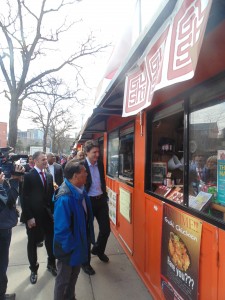Laneways untapped realm of urban design

In April 2014, then federal Liberal leader Justin Trudeau visited Scadding Court Community Centre’s innovative street food and retail market, housed in retrofitted shipping containers. Market 707 is one of the models consultants are studying as part of their research to develop a business plan for Westbank’s Honest Ed’s Alley.
Brian Burchell, Gleaner News
By Annemarie Brissenden
How do you create a micro-retail hub that will attract shoppers, incubate new businesses, and be self-sustaining? Developers at Westbank Projects Corp. are hoping that Honest Ed’s Alley will embody the answer to that question.
Planning for the new laneway, which is part of the company’s Mirvish Village redevelopment and will run parallel to Bathurst and Lennox streets, is tapping into a broader urban planning campaign that aims to do everything from increasing public space to adding density while preserving a neighbourhood’s character.
“There’s a growing movement in Toronto around laneways,” said Michelle Senayah, co-director of The Laneway Project at Laneway Confessions, a Nov. 26 summit about laneway transformations. Toronto has approximately 2,400 laneways, or 250 acres of space, primarily concentrated in the city’s downtown and midtown neighbourhoods.
They are, as Denise Pinto, the global director of Jane’s Walk, put it at the summit, “public spaces we need to unlock”.
Presenters at the summit spoke about the different keys that can open up this untapped realm: using visual art to transform a vandalized space; replacing concrete wastelands with gardening plots and park space; gently intensifying densification; and creating a micro-retail hub.
“How do you incubate micro-retail in the city?” asked Howard Tam of ThinkFresh Group, explaining that the purpose-built Honest Ed’s Alley will provide an affordable space for the smallest of businesses.
Tam added that creating such a space is so new that there’s little data on how best to position vendors for success, or even on what constitutes micro-retail — everything from a pop-up shop to a ceviche stall to a lemonade stand.
However, what all micro-retailers have in common is their small size (both in staff and space), their brief tenure, their growth potential, and their ability to function with few services or supports.
ThinkFresh, along with the Centre for Social Innovation (CSI) and The Next Practice, has been retained by Westbank to develop a model for Honest Ed’s Alley that will promote innovation and encourage incubation.
The consultants have just completed a study of 145 micro-retailers from 14 festivals, pop-up shops, and flea markets across Toronto aimed at developing an understanding of the city’s micro-retail sector.
They also hosted a Nov. 27 design charette at Markham House to canvass vendors, market managers, policy-makers, and local residents for ideas about what the future alley should look like.
“It’s still very early in the thinking phase,” said Kevin Hurley, CSI’s special projects manager. He added that the consultants are exploring how the management structure would work and what the financial model should be, so no decisions have been made yet about how the alley would operate or who would oversee the space.
“No developer has ever contemplated purposely building a space like this,” said Tam. “And that really intrigued us.”
“Westbank is trying to push the limits of what anyone is doing at the ground level of high-rise buildings in this city,” explained Jeb Brugmann, The Next Practice’s managing partner, a business innovation consultant. “There are long periods of vacancy on the ground floors of residential buildings because residential builders don’t understand local retail and commercial needs.”
The three consultants, who are all interrelated by way of CSI — ThinkFresh is a CSI member, and Brugmann sits on CSI’s board of directors — seemed like a natural fit for Westbank, said the company’s project coordinator, Jonah Letovsky.
“This is an opportunity for combining [CSI’s] model for social entrepreneurship with our model for physical space,” he said.
Letovsky added that Westbank sees micro-value as adding value to the neighbourhood, and that Honest Ed’s Alley is an “opportunity to return a fine-grain retail streetscape to this portion of Bloor and Bathurst [streets]”.
